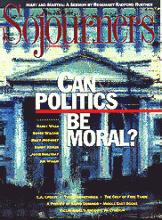"My experience and observations confirm that politics as the practice of morality is possible."
- Former President of Czechoslavakia Vaclav Havel, 1992
Is politics as the practice of morality possible in this country? Recent public opinion surveys suggest that most Americans think not, at least not now.
Most of us have come to see politics as the cynical, if not sinister, art of manipulation and deception, of exclusion and inequality, of public impoverishment and private gain. As for democracy, it's great stuff for high school civics textbooks and Fourth of July oratory, but most of us don't think it has much to do with "politics" as we know it.
A moral politics--a politics rooted in truthfulness and compassion, in human dignity and equality--is what democracy should be all about. As a people who profess that democracy is what we stand for, this is the kind of politics we should aspire to.
To be sure, as Havel reminds us, "As long as people are people, democracy, in the full sense of the word, will always be no more than an ideal...[to be approached] as one would the horizon." Yet without ideals to aim for, horizons to move toward, we are left with little inspiration or direction for making things better.
Issues of democracy are not simply political issues; they are moral issues as well. Truth-telling as the bedrock of our political discourse is a moral issue. Public accountability on the part of our elected representatives is a moral issue. Equal opportunity to run for public office and to be heard by those in office is a moral issue.
Read the Full Article

